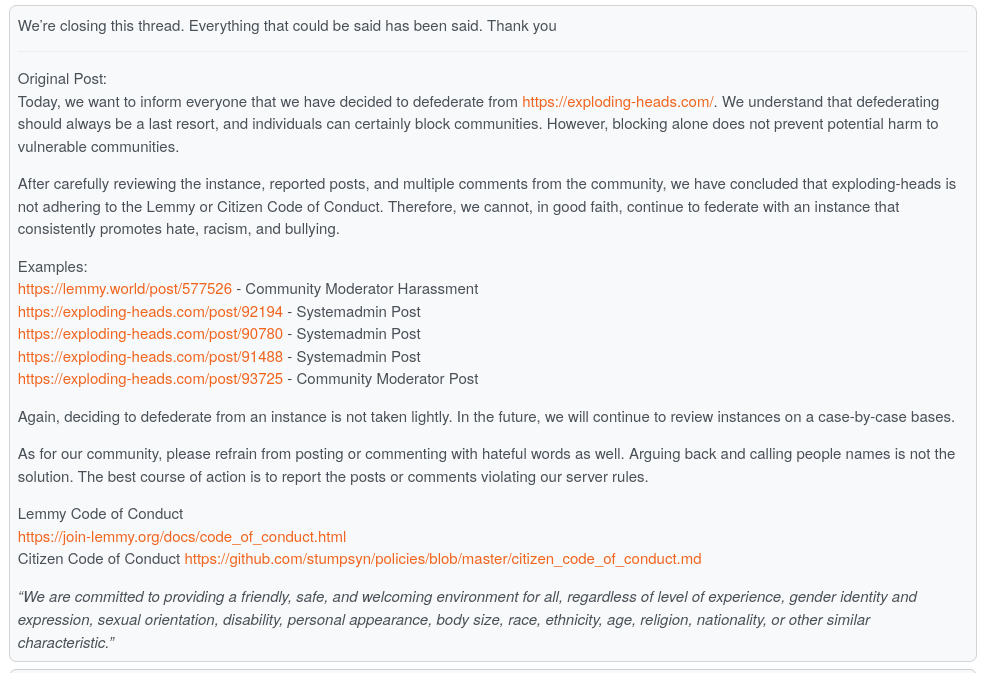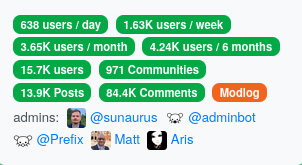What is lemmy.world doing defederating before hexbear even federates? lemmy.world/instances
This is what it took to defederate from exploding-heads after being federated with them since the start of lemmy.world

https://lemmy.world/post/747912?scrollToComments=true
What evidence do you have of hexbear breaking the lemmy or citizen code of conduct?
Has the criteria for defederation changed?
Hexbear is one of the largest and most active lemmy instances:

Compared to lemmy.ml:

Compared to lemm.ee:

and lemmy.world:



Would you prefer Authoritarian Left instead? Because authoritarian is authoritarian is authoritarian. Left or right fuck off with your supreme leader bullshit.
“Authoritarian” is fairly meaningless in this context. All societies and political structures rely on authority to maintain social control to greater or lesser extents. What is the difference between a tax collector and an armed robber? Both demand money from you and threaten violence if you don’t give it to them. The main (and some would say only) difference is in authority. The tax collector has authority, the robber does not.
Where does liberal “democracy” derive its authority from? Most liberals will claim that it comes from the approval of the people or the democratic mandate (same thing, really). Why then do studies repeatedly show that there is no correlation between popular opinion and policy? Why do the majority of Americans want public health care and yet it never passes?
There is no democratic mandate in liberal democracy, it certainly doesn’t result in policy that represents the real will of the people. The people can vote a guy out? And what? Replace him with a different dude who won’t do what the people want?
What happens if someone picks up a gun and tries to oppose the “democratic” consensus anyway in a liberal democracy? Do you just sit by and let the state be destroyed? No, the democratic state uses its own authority to oppress this opposition.
There is no such thing as a distinction between “democracy” and “authoritarian”. It’s a meaningless buzzword. The opposite of a democracy is an autocracy or an oligarchy, not “authoritarian”. That’s just something westerners fling at other people’s democracies which they don’t like for daring to vote for something against US interests and want to see them blown up and millions killed and displaced. Every state seeks to preserve itself and so every state will use authority when it is faced with potential destruction. This is not inherently a bad thing, it obviously depends on the government in question, and who is trying to destroy it, and why. People always justify the use of authoritarian means used by whoever they support, and then those who are intellectually dishonest pretend that somehow their use of authority isn’t “authoritarian”.
“Authoritarian” doesn’t refer merely to the existence of authority. It refers to a system under which, on balance, individual liberty is secondary to governmental authority - a system under which there is more likelihood that an individual will be constrained by authority than that theybwill be free to act as they choose.
And note, before you even go there, that that doesn’t mean or imply no individual liberty. Again, the issue is the balance between individual liberty and governmental authority.
Why are we suddenly talking about democracy?
Why are we now suddenly talking about representative “democracy” instead?
Yes - of course there’s a gap between actual public sentiment and the machinations of representatuve "democracy - that’s most of the point. It’s a system that’s been sold to the unwary to give them an illusion of self-determination behind which the oligarchs can hide.
How is that relevant to anything? (Other than a broad argument against institutionalized authority in general, which I’d agree with).
Not necessarily, but as a general rule, there is, simply because it’s more difficult for oligarchs in a representative democracy to enact their will. There’s a number of hoops that they have to jump through in order to maintain at least some semblance of serving the will of the people, and that specifically because the people still retain some significant freedoms (remember - it’s about the balance between freedom and authority).
In effect, oligarchs in a representative democracy have to trick or coerce people into not exercising their freedoms or exercising them poorly.
In an authoritarian system, the balance favors the government in the first place, so they’re far more likely to be able to simply issue decrees and then enforce them, without having to muck about with all of the pretending to be serving the will of the people stuff.
Granted that it’s not as significant a difference as gung-ho Americans might wish to believe it to be, there is still a difference.
Actually, I would say that it is inherently a bad thing.
That’s an awful lot of why I’m an anarchist - I believe that institutionalized authority cannot be justified and is inevitably destructive.
But that’s sort of beside the point.
This reads like classic projection.
And in fact, I just wrote another post in which I pointed to what I believe to be the fundamental flaw at the heart of the tankie position, and it was pretty much exactly what you wrote here.
My position is that if you’re going to hold that authority is legitimate, then that means that you are legitimately subject to it. You don’t get to pick and choose, just as you wouldn’t allow those who would be subject to your authority pick and choose. Just as you hold that they’re rightly subjugated if those with whom you agree are in power, you’re rightly subjugated if those with whom they agree are in power.
It’s either that or you carry your aversion to being made subject to someone else’s authority to its logical conclusion and cede to others the exact same freedom you wish to have yourself.
You can’t have it both ways. You’re not some sort of demi-god, deserving of special treatment. If you can rightly oppress others they can rightly oppress you. If they can’t rightly oppress you, you can’t rightly oppress them.
That last is the main reason I’m an anarchist.
Individual liberty is secondary to governmental authority in ALL states. Your liberty ends exactly where it harms the ability of the state to exert its authority. The perceived liberty you believe any state gives only exists within strict boundaries where the use of that liberty does not threaten the state, as soon as it does threaten the state you become the subject of repression. This is true of all states, socialist or liberal.
We’re talking about liberal democracy because the implication you made was that “authoritarian” states should be opposed whereas the status quo should be maintained. The implication you made was not between anarchism and socialism, it was between what currently exists and what MLs would like to replace it with. You were placing yourself in defence of liberalism when you did this, not anarchism.
What system? You’re not naming a system, you’re vaguely saying “authoritarian system” with no real definition. Describe the authoritarian system. How do their elections work? What is its structure? How do their votes work? How do their courts interact? What is their constitution? Etc etc.
This vague “authoritarian system” is the culprit here for the problems. It’s “bad country” with no real material description or understanding of how “bad country” functions. This is the very point I tried to raise in my first comment, that this wordplay is used to denote “bad country” whenever it has chosen to do something that opposes US (or generally western) interests.
Sure. I was an anarchist until not too long ago so I don’t actually disagree with you. States are bad. There’s a reason we all want to achieve their eventual abolishment, whether or not we disagree on how to get there. We generally agree that states do bad things. The liberal state does bad things in service of defending the liberal state and maintaining the status quo, the socialist state does bad things in service of defending the socialist state.
Pointing out the capitalist state does exactly everything that the socialist state does in one way or another is not projection. Come on now you’re better than this you don’t need to go to bat for liberalism as part of your opposition to socialism.
So do you believe in using authority to kill fascists? Do you believe in using authority to prevent liberals from rebuilding a capitalist state in your newly stateless anarchist collective? What are you going to do when one part of the population decides to start a state? Let them or fight them? As an anarchist my understanding of authority was significantly more fleshed out than this, I knew full well that as anarchists we would be exerting authority on some part of the population during and after revolution until achieving what we wanted, and that we would then violently prevent its destruction. Are you opposed to Mahkno and his army violently overthrowing and instilling their ideology on their opposition? Are you opposed to the Spanish anarchists of revolutionary Catalonia violently fighting a civil war for their ideology? Why do you not consider these actions of violence to be the violent use of authority by one part of the population upon another? You can not be a revolutionary and also be against the use of authority, they are strictly in conflict, even as an anarchist if you ever see or take part in an anarchist revolution you will be directly oppressing the opposition through use of force at some stage or another.
Lol. Ok.
That’s not really a good-faith response. You’re not engaging with what “authority” actually means, or why one state that murders and imprisons people for trying to overthrow the state is different to another state that murders and imprisons people for trying to overthrow the state, these happen under both. What is the country with the largest prison population in the world? Do you not consider that authoritarian? Why not? The US operates Guantanamo on land that Cuba doesn’t want it on, and refuses to close Guantanamo and return the land to the Cuban people, is that not authoritarian? Why not?
What specific part of Cuba’s electoral system is authoritarian?
Polcomp is an intellectually impoverished and politically illiterate system
Here is an alternative Piped link(s): https://piped.video/watch?v=9nPVkpWMH9k
Piped is a privacy-respecting open-source alternative frontend to YouTube.
I’m open-source, check me out at GitHub.
Weird how I’ve been in so-called “tankie” spaces for years and I never hear praise for authoritarian leaders. It’s almost as if all these “tankies bad” whiners are just liberals who don’t know shit about communism and are literally indistinguishable from the “woke bad” nonsense I hear from reactionaries.
I never said anything about you praising authoritarian leaders, that’s the picture you’re painting in your head. Whether or not you’re praising them, I think ‘supreme leader’ encompasses the definition:
Unquestionable obedience. Like a master and a slave. Like a dog.
‘Tankie’ is often associated with Marxist-Leninists.
Taken from the ‘communism’ wiki page,
Would you look at that. Authoritarian approach. The root of disagreement among communist.
Wow a completely misinterpreted paragraph copied directly from wikipedia, you sure showed me.
You started going on about “supreme leaders” out of nowhere, how exactly was I supposed to interpret that?
Either way I think it’s funny that the other user who replied to you gave a much more detailed and educated answer than I did yet you chose to ignore them and reply to me instead. You don’t actually to want to have a conversation and learn things, you’re just here to troll.